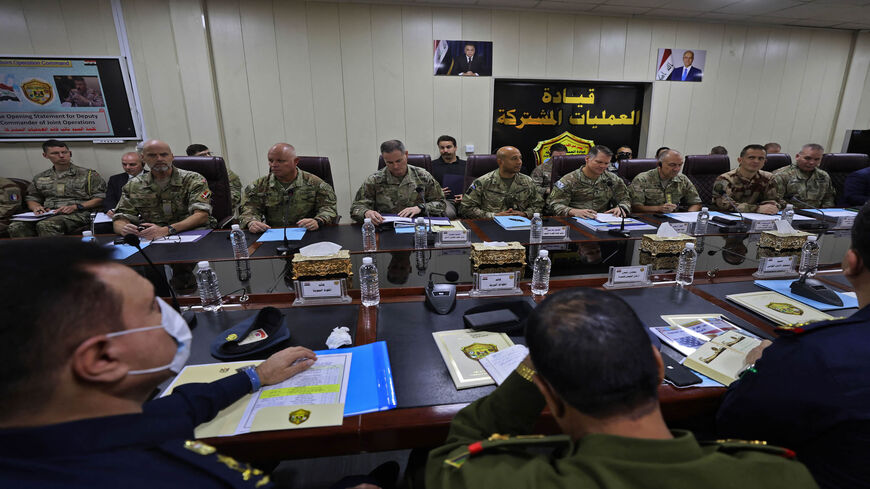The Iraqi government has announcement the end of the international forces’ mission in the country, renewing controversy over the concept of resistance and the legitimacy of its weapons in a law-abiding democratic state.
Iraqi Prime Minister Mustafa al-Kadhimi announced Dec. 29 the end of the international coalition forces’ military mission and their exit from Iraq after nearly seven years of fighting against the Islamic State.
Kadhimi confirmed in a tweet that the international coalition’s role has become restricted to advising and assisting the Iraqi army and support according to the strategic dialogue. He thanked the countries and the coalition’s leaderships, Iraq’s neighboring countries and partners in the fight against IS, stressing the Iraqi forces’ readiness to defend the people.
Yet controversy in the country persists as to the situation of the US troops in Iraq, especially in the eyes of parties close to Iran.
The Fatah Alliance, led by Hadi al-Amiri, raised doubts about the US forces’ exit from the country, calling on Kadhimi to reject even any advice or military assistance to the Iraqi forces.
In a speech during a funeral reception in Diyala governorate Dec. 25, Amiri said, “We do not accept that Iraq’s sovereignty be undermined. We do not accept one soldier to remain either in Ain al-Assad base [in Anbar governorate] or Harir air base [in Erbil governorate, in the Kurdistan Region], whether as trainers or advisers.”
The Huqooq Movement, the political wing of Kataib Hezbollah, announced in a statement that the “movement remains insistent on its basic and main demand, which is to end the US presence in Iraq completely, without any pretext and under any circumstances.”
It continued, “Iraq has security forces, the Popular Mobilization Units, and resistance factions, which are enough forces to maintain the security of Iraq and Iraqis.”
Meanwhile, the leader of the Sadrist Movement, Muqtada al-Sadr, announced Dec. 30 12 necessary steps for the “actual departure of the foreign forces: a formal legal request sent to the Security Council for approval, and the need to specify the tasks of these forces as part of a list that should not be violated.”
He said that the number of foreign troops in Iraq should also be determined, based on the required specialization, while the movements of the remaining individuals from and to Iraq ought to be decided in accordance with the applicable Iraqi diplomatic laws.
The Iraqi forces are in dire need of continuous international support to control airspace and the country’s borders, as they lack equipment and training due to years of corruption in armament contracts, in addition to the presence of militias and parties controlling the security apparatuses, which was evidenced by these forces’ inability to prevent IS from occupying two-thirds of the country in 2014 and the battles with the terrorist group that are ongoing to this day.
Talk about refusing any military advisers in the country could be used for political one-upmanship and the desire to embarrass the Iraqi government, which reached an agreement on the foreign troops’ departure after a long series of talks that began in the summer of 2020 with the US administration, and under the 2008 security agreement between the two countries, which provides for the ending of the deal should one side decide to end all security coordination as per Article 30 of the agreement.
On Dec. 31, the armed Shiite factions had decided to open the door for volunteering in the “armed resistance” against the “occupation forces,” but said that this date will be postponed until further notice due the Christmas celebrations at the request of leader of the PMU-affiliated Babylon faction, Rayan al-Kildani. These factions, however, continue to target military convoys and the US Embassy and consulates in the country.
Observes believe that the Iraqi government’s success in negotiating with the US-led international coalition has confused the political calculations of the parties and factions opposing Kadhimi, as the latter had fulfilled his promises since he came to office, including the withdrawal of foreign troops and continuation of security plans that he has put in place to confront movements across the Iraqi governorates.
The armed factions are trying to distort Kadhimi’s achievements and raise doubts about the actual withdrawal of US forces, in a bid to uphold their resistance discourse to their grassroots. It is likely that this confrontation will move the new parliament arena, in which the Shiite parties holds the majority of seats.
The ongoing debate in Iraq about the legitimacy of the “resistance weapons” is likely to escalate after the withdrawal of foreign troops, and the next government will face a real challenge in limiting arms to the state and restrict the armed militias that have been deployed since 2003.

